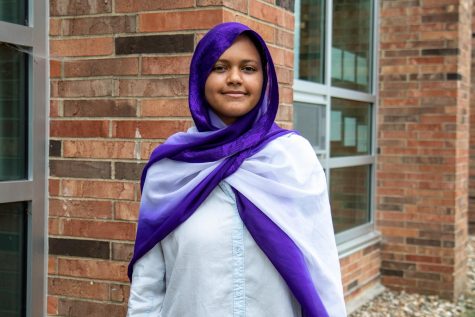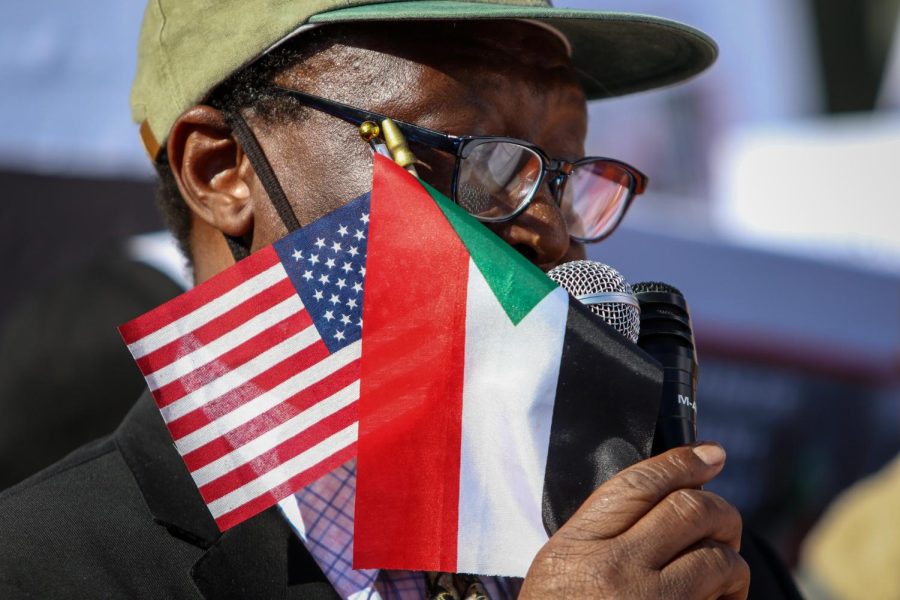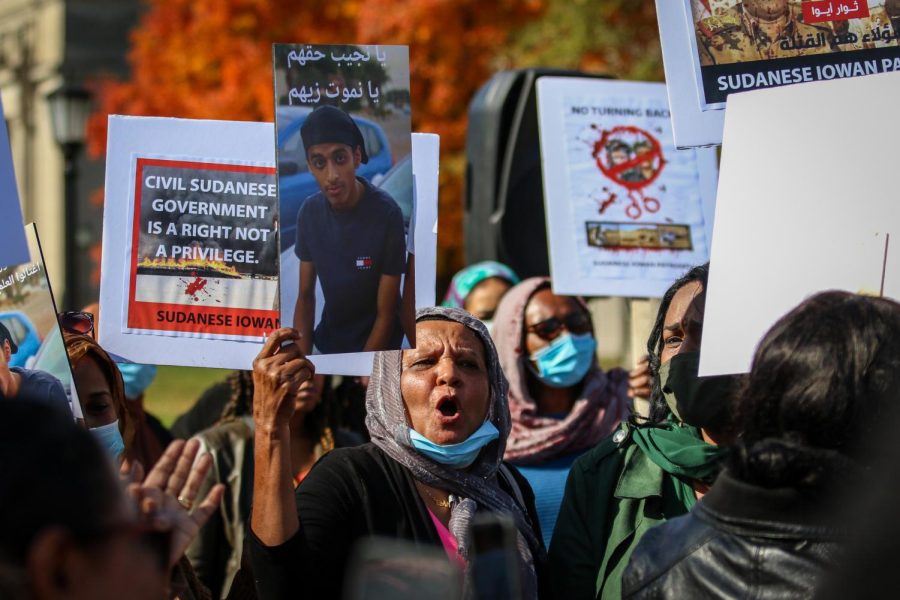Sudan’s fight for democracy
Abdel Fattah al-Burhan initiated a military coup overnight in Sudan Oct. 25. WSS interviewed students on their thoughts concerning the situation.
A man protesting the military coup in Sudan holds the American and Sudanese flag in his hand while addressing the crown at the Pentacrest in downtown Iowa City on Oct. 30.
For the past two years, Sudan was leaving the era of military rule of decades and transitioning into the light of democracy with a temporary transitional government composed of both military and civilians to the promised public elections in 2023. However, the promise was broken when the military started a coup, forcing citizens out on the streets, chanting “No, no for military rule.”
It was agreed upon that the transitional government made of both civilian and military representatives would remain in power until 2022, with Hamdok as Primer Minister. The goals and actions created a sense of stability in the country. Hamdok led Sudan off of the United States Sponsor of Terrorism list in late 2020. This has allowed them to receive foreign investment, for institutions like the world bank. This allowed them to make strides to correct their massive debt.
On Oct. 25, the military of Sudan had betrayed the agreement signed in Aug. of 2019, with the Forces of Freedom and Change and took control over the country, declaring a coup d’etat. The military had kidnapped and arrested many new government officials, ministers, and civilian leaders; their whereabouts were unknown to the public, meanwhile, the military claimed that some of them are “under house arrest.”
Multiple Sudanese students at West High share their thoughts on the political status in Sudan and how it impacts them. Alfadel Altom ’26 happened to be in Sudan three months ago, he described how he found the country.
“There’s lots of people that are in the military. When I was in Sudan, two or three months ago, there was so much military,” he said.
Ever since Nisreen Algaali ’22 heard of the coup, she has been talking, posting and reposting information about Sudan’s situation.
“I spoke about it a lot in my classes and people from school followed me,” she said. “So I’ve been posting everything on social media. I’ve been trying to get everything to go around.”
The main concern that Sudanese people living aboard have is their families in Sudan. With the coup and the rise of protest, the internet is being blocked continuously and basic needs are becoming short.
“The money value have like just gone over, things that used to be $5 are now $30 I’m just putting some estimations here,” Fadlelmoula said. “That’s why it’s so hard for us if we were to send money because its value is really hard to predict.”
The coup was all of a sudden and wasn’t well organized, but it had turned the country insatiable as the Sudanese citizens turned into peaceful protests, flooding the streets of the capital, Khartoum and major cities around the country. However, al-Burhan claims the coup was necessary to prevent the breakage of a civil war due to the growing tension within the transitional council between the military and the civilian leaders.
It was Omar al-Bashir who seized control during a coup in 1989 pushing the original democratic government out of power. The 30-year dictatorship under the military government was a time of corruption and violence for the citizens of Sudan.
“Part of my family is in the military,” Altom said. “When I talked to some of my family, they said that some of them actually aspired to be part of the military.”
The problem with Sudan’s military is that they tend to govern and control the country rather than just defending it. During the revolution to overthrow al-Bashir, the military was attacking peaceful protesters and was responsible for massacres.
“We want to create our own government and to take out all the people in the military and to hold them all accountable for everything they’ve done,” Algaali said.
A digital pamphlet with information about the coup in Sudan and how students can help was distributed at West High on Nov. 1. Razaz Elhassan ’22 created the pamphlet in hopes to bring light to the topic and support to Sudanese students within the school.
Shahad Abudalla ’22 described how she heard of the coup.
“My dad’s side of the family is very into politics, and so it was a natural discussion to us,” Abudalla said. “I found out about the coup from my dad, and when he expressed that he can’t contact my uncle.”
Fadlelmoula had found out about the coup from his parents.
“My mom couldn’t speak to her family back home, and we knew something bad was happening. I saw bodies cut in halves, their eyeballs are out from my mom’s phone,” Fadlelmoula said. “Even kids are dying.”
Algaali encourages raising awareness of the issue among students and those who are not aware in the community.
“I would urge [students] to tell everybody because the power of telling people and getting a lot of people to tie in on a conflict will get the bigger people in power who are trying to ignore the situation to have to do something because everybody’s demanding them to do something about it,” Algaali said.
However, Altom disagrees with only raising awareness as being an effective method of support.
“Raising awareness to everything is good, but it’s barely doing anything,” Altom said. “You have to raise awareness and act, because well, without acting raising awareness is just pointless.
On Oct. 30, the Sudanese community within Johnson County organized a big protest in downtown Iowa City at the Pentacrest. Youth, families, Sudanese and non-Sudanese marched through downtown in support of the protests happening in Sudan right at the moment. Similar protests were around other cities in the U.S. and countries in the West.
As the situation continued to escalate, the injured civilians and casualties only increased as the “march of millions” reached its peak on Oct. 30. Only when a civilian democratic government is achieved to direct the country away from corruption.
“The biggest one [concern] has to just be the lack of democracy, because democracy can create stability,” Altom said.
The rest of the students also agreed that a democratic, civilian lead government would be the solution to develop the country.
“Like Rwanda is a good example. It went to democracy. Look at it now, it’s one of the safest countries in Africa,” Altom said.
Paraeducator Ismail Mohamed Bakheit doesn’t look forward to the government in control right now because there are still individuals from the corrupted government who are still in it.
“Only with a democratic, popular, public, and fair elections where citizens are the one choosing their leaders and not having nominees raising to power will democracy be achieved and a future would be made for the country,” Mohamed Bakheit said.
As November started, Sudan’s top General Abdel Fattah al-Burhan was pressured by other countries and the UN to bring an end to the coup. Al-Burhan then released four detained ministers who don’t face any criminal charges, and stated the military would not be affiliated with ruling the country once the power is handed over to “a civilian government of national competency.”
At least 14 demonstrators have been killed and about 300 wounded. The internet blockage in Sudan remains for almost two weeks now, silencing the citizen’s voices from reaching the world.
Continuing to spread the news about the political situation is the best weapon for many outside of the country.
Two Sudanese students at West High are in the middle of organizing a fundraiser for Sudan to support the protesters and the citizens. More details are about to come.
As of now, the future remains unclear. al-Burhan is looking into assigning a new prime minister and is still committed to initiating elections in July of 2023. However, the people are still streaming down the streets, demanding justice for those who sacrificed their lives for the long fight for democracy and their rights.
Your donation will support the student journalists of West High School. Your contribution will allow us to purchase Scholarship Yearbooks, newsroom equipment and cover our annual website hosting costs.

Mishka Mohamed Nour is a senior at West. This is her second year on staff working for the online publication as the online profiles editor. She enjoys...

(she/her) She is a senior this year, and she is also the Co-Managing Editor and Podcast Editor for web this year. In her free time, you can find her at...





